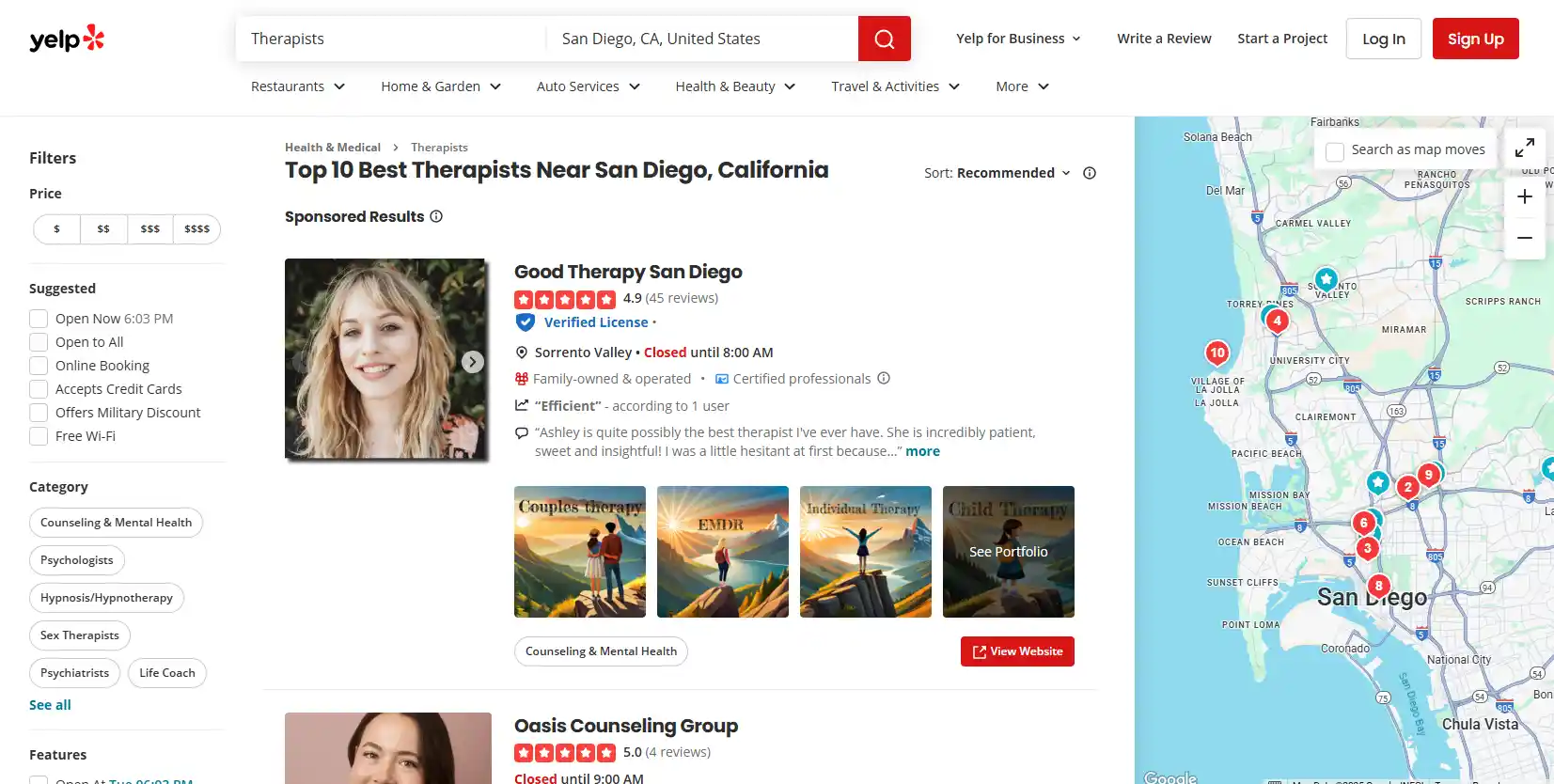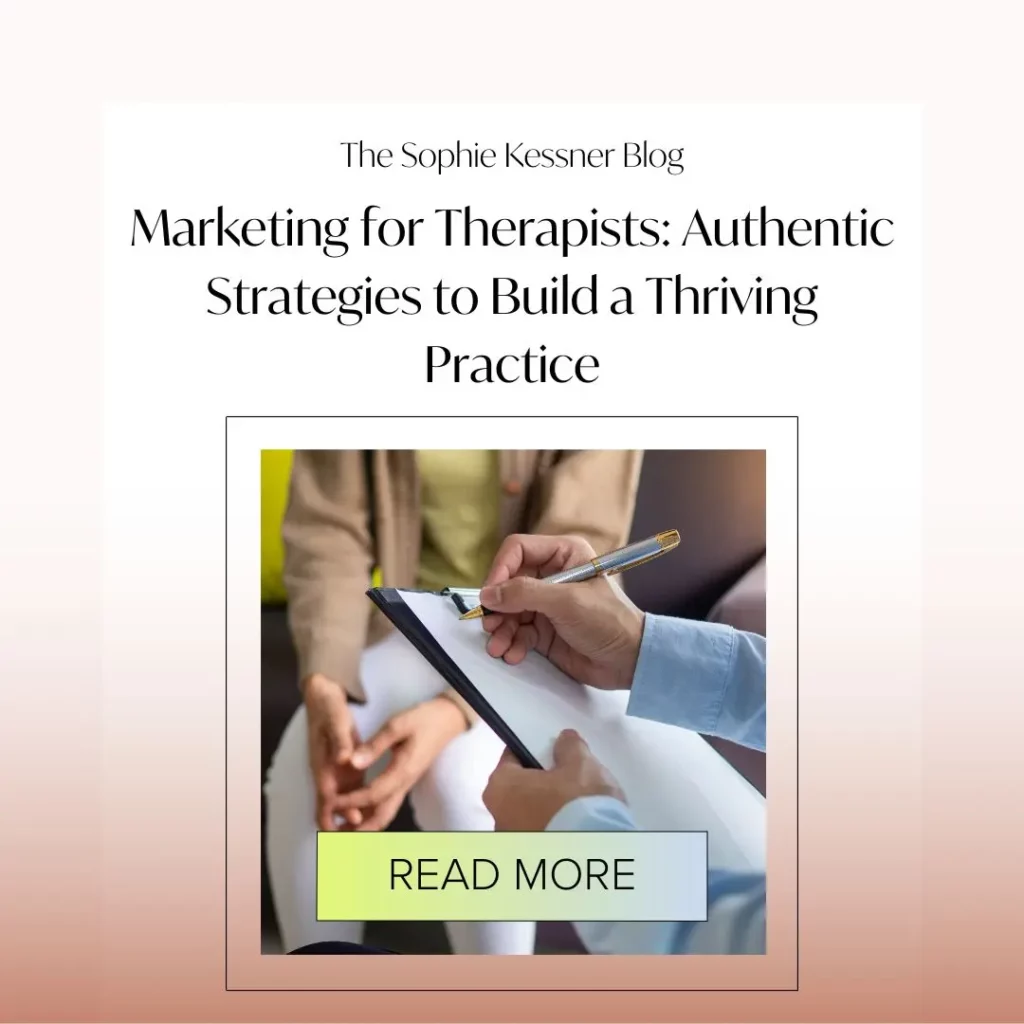Marketing for therapists can feel uncomfortable at first. After all, as helpers, it often feels strange to focus on selling services. But here’s the truth: marketing isn’t about being pushy or salesy. It’s about reaching the people who need your support and building trust with them. A strong online presence is crucial; 80% of individuals search for health-related information, including therapy services, online. Embracing marketing strategies that align with your values can help you connect with your ideal clients. You’ll learn practical, no-fluff strategies that help you stay true to your values while building a thriving, meaningful practice through effective marketing strategies.
Laying the Foundation: Understanding Modern Marketing for Private Practice Therapists
Marketing today isn’t just about handing out business cards or hoping word of mouth does the trick. In 2025, therapists need a solid online presence to reach the people who need help. The way people find therapy has changed, so it’s important to stay on top of these shifts to stay competitive.
Online marketing is crucial for therapists in enhancing visibility and attracting clients.
Marketing is key for therapists. You might be the best therapist in town, but if people can’t find you, it’s tough to grow your practice. Marketing helps get you noticed, attract the right clients, and build a lasting business. Just having a website isn’t enough anymore—marketing makes sure you’re visible when it matters most.
Authentic marketing isn’t about pushing sales—it’s about connecting. For therapists, it’s all about offering value, building trust, and being consistent. When you’re ethical and transparent, marketing can actually boost your reputation and bring in clients who connect with your approach.
Effective therapy marketing rests on a few key principles:
Know your ideal client—who they are, what they struggle with, and how you can help.
Offer value consistently—whether that’s through content, referrals, or social media.
Be patient—growth doesn’t happen overnight, but over time, your efforts will pay off.
Maintain ethical boundaries—always be transparent about your qualifications and services.
Building a successful practice in 2025 requires understanding and embracing these principles and implementing effective online marketing strategies. By doing so, you’ll attract the right clients and create a meaningful, lasting impact.
Defining Your Niche and Ideal Client

The Power of Niching Down
Specializing in a particular area of therapy helps you stand out in a crowded market. By focusing on a specific niche, you can attract the clients who need your expertise most. It’s not about limiting yourself—it’s about amplifying your strengths and aligning your practice with the people you are best suited to help.
Identifying Your Ideal Client and Potential Clients
Consider the following factors when defining your ideal client and understanding your target audience:
Demographics: Age, gender, and other relevant characteristics.
Psychographics: Interests, values, and lifestyle.
Specific Needs: The struggles they face (e.g., anxiety, depression, relationship issues).
Your Expertise: Reflect on your training, experience, and the types of clients you enjoy working with the most.
Creating Client Persona
Develop detailed profiles of the types of clients you want to attract. These personas should include:
Personal background (age, occupation, etc.)
Pain points or challenges they are dealing with
How you can provide the most support
Goals they want to achieve through therapy
Communicating Your Niche Effectively
Once you have a clear understanding of your niche and ideal client, ensure your messaging reflects this across all your platforms:
Website: Make it clear who you help and how you do so.
Online Directories: Be specific about your specialties and services.
Social Media: Share content that speaks to your ideal clients’ needs and struggles.
By defining your niche and ideal client clearly, you create a focused marketing strategy that resonates with the people who will benefit most from your services.
Building a Strong Online Presence: Your Digital Home and Online Marketing

Your website serves as your virtual storefront, giving potential clients their first impression of you and your services. It’s essential to make it count. A professional, easy-to-navigate website is the foundation of your online presence.
Google Ads is a powerful tool for targeted advertising, allowing you to select specific keywords to effectively reach potential clients. By appearing in search results, Google Ads can significantly enhance your online visibility, making it a cost-effective strategy for attracting new clients. However, it’s important to consider the competitive nature and costs associated with such advertising.
Your Professional Website: The Cornerstone
A well-designed website is key to building trust with potential clients. Here are the essential pages your website needs:
Homepage: A welcoming page that explains who you are and what you offer.
About: Share your story, qualifications, and therapy approach.
Services: Outline the therapy services you provide, including specializations.
Contact: Provide an easy way for potential clients to get in touch with you.
Blog: An optional page where you can share helpful content related to your niche.
When designing your website, prioritize user experience (UX). Ensure your site is mobile-friendly and easy to navigate. Clear call-to-action (CTA) buttons (like “Book a Session” or “Contact Me”) help visitors take the next step and reach out to you.
Search Engine Optimization (SEO) for Therapists: Getting Found Organically
SEO helps your website rank higher on search engines like Google, making it easier for potential clients to find you online. Start by conducting keyword research to discover the terms your ideal clients are searching for, such as “therapy for anxiety” or “San Diego marriage counselor.”
On-Page Optimization
Once you’ve identified the right keywords, incorporate them naturally into your website’s content. This includes headings, body text, and image alt text. Be sure to optimize each page on your site for SEO to increase your chances of appearing in relevant search results.
Local SEO
Since many clients search for local services, it’s essential to optimize for local searches. Include your location (e.g., “therapist in San Diego”) in strategic places on your site, such as in the footer, contact page, and blog posts. Claiming and optimizing your Google My Business profile also helps with local SEO.
Site Speed and Security
Your website’s speed and security are crucial for both SEO and user experience. A slow website can turn potential clients away, so ensure your site loads quickly. You can easily check your website’s speed using tools like Google PageSpeed Insights. Use HTTPS (a secure connection) to protect your visitors’ data, especially when they fill out contact forms or book appointments.
Choosing the Right Domain Name and Website Platform
Selecting a simple, memorable domain name is important for branding. Choose a name that reflects your practice, and keep it short and easy to spell.
As for website platforms, WordPress is a popular choice for its flexibility and ease of use, but platforms like Squarespace and Wix are great options for those looking for something more user-friendly.
In summary, a strong online presence starts with a solid website. It’s your digital home and should reflect your professionalism and the value you offer. By optimizing your website for SEO, ensuring it’s user-friendly, and making it easy for clients to get in touch, you’ll increase your chances of attracting the right clients to your practice.
Expanding Your Reach: Leveraging Online Directories and Listings

Online directories are a powerful way to get your name in front of potential clients. These platforms help people find therapists and other mental health professionals based on their specific needs and location. By having a well-crafted profile on these directories, you can increase your visibility and reach those who might not have found you otherwise.
To discover the best directories for therapists and how to optimize your profile, click HERE to read our latest blog article.
The Value of Therapist Directories
Therapist directories provide an easy way for individuals to search for mental health professionals in their area or within specific niches. Being listed on reputable directories boosts your credibility and gives you a higher chance of being discovered by those in need of support.
Key Directories to Consider
Here are some essential directories where you should list your practice:
General Directories: Platforms like Psychology Today, TherapyDen, GoodTherapy, and Mental Health Match cater to a broad audience.
Niche Directories: Websites like Therapy for Black Girls, Inclusive Therapists, and LGBTQIA+ specific directories can connect you with clients looking for a therapist who understands their unique needs.
Local and International Directories: Don’t forget to list your practice on local directories and global platforms that cater to a wider audience.
Creating a Standout Directory Profile
A well-crafted directory profile helps you attract the right clients. Here’s how to make it shine:
Professional Photo: Choose a warm, approachable headshot that reflects your personality.
Compelling Bio: Write a bio that highlights your experience, approach, and what makes you unique. Show your potential clients that you understand their struggles.
Specialties and Categories: Select the relevant services you offer, such as anxiety, trauma, or couples therapy, and ensure your specialties match your ideal clients’ needs.
Client Reviews: Showcase positive testimonials from clients (when allowed) to build trust.
Multimedia: Some platforms let you upload videos. A brief video introducing yourself and your practice can make a great impression.
By leveraging online directories, you increase your chances of connecting with people seeking the exact therapy services you offer. Keep your profile updated and ensure your information is clear, honest, and aligned with your niche.
Connecting and Engaging: Social Media Strategies for Therapists

Prospective clients can be effectively reached through social media, which has become a valuable tool for therapists to connect with their audience. When used authentically, it can help you build trust, share knowledge, and engage with potential clients. The key is to maintain a professional and compassionate presence while being mindful of privacy and ethical boundaries.
Why Social Media Can Be Valuable (When Used Authentically)
Social media gives you a platform to show your expertise, share valuable content, and connect with people in a way that feels real. It’s not just about gaining followers; it’s about creating meaningful relationships. By sharing helpful insights, tips, and resources, you show your audience that you care about their wellbeing, which helps build trust.
Choosing the Right Platforms for Your Audience
Not all social media platforms are right for every therapist. It’s important to choose the platforms where your ideal clients are most likely to spend their time. Here are some common options:
Facebook: Great for sharing articles, hosting groups, and engaging with local communities.
Instagram: Ideal for sharing images, quotes, and personal stories that resonate with your audience.
LinkedIn: A more professional platform where you can network with other professionals and share industry-related content.
TikTok: If you’re comfortable with it, TikTok offers a fun way to share bite-sized insights, especially around mental health tips and stigma-breaking content.
Creating Engaging and Valuable Content
When posting on social media, focus on offering value:
Tips and Resources: Share mental health advice, stress management tips, or mindfulness exercises that help your audience.
Personal Insights: Share your thoughts on relevant topics, maintaining a professional tone but allowing your personality to shine through.
Visual Content: Use images and videos that are informative, engaging, and relevant to your practice.
Stories, Reels, and Live Sessions: These features are great for more personal engagement, but be mindful of maintaining professional boundaries.
Engaging with Your Followers and Building Community
Responding to comments, participating in discussions, and joining groups related to mental health can help you establish a supportive online community. Social media allows you to offer ongoing support and connect with others in a meaningful way.
Maintaining Professional Boundaries on Social Media
While social media offers great opportunities, it’s essential to maintain ethical boundaries. Always respect client confidentiality, avoid dual relationships, and ensure that your posts don’t blur the lines between professional and personal.
Using social media thoughtfully can be a powerful way to grow your practice and build lasting connections with potential clients, all while staying authentic and aligned with your values.
The Power of Content Marketing: Providing Value and Building Authority

Mental health support is a crucial aspect that can be effectively addressed through content marketing, making it a powerful tool for therapists looking to build their online presence. By creating valuable content, you not only educate your audience but also establish yourself as a trusted authority in your field. Whether it’s through blogging, podcasts, or videos, content allows you to connect with potential clients in a meaningful way.
Blogging for Therapists: Connecting and Educating
Blogging is one of the most effective ways for therapists to share their knowledge and expertise. When done right, it can attract the right clients to your practice while providing helpful resources.
Here’s how to get started:
Generate Blog Post Ideas: Focus on topics that resonate with your niche and ideal clients. For example, if you specialize in anxiety, write posts that offer tips for managing anxiety or discuss common triggers.
Write Helpful, Informative, and Engaging Content: Aim to create posts that offer real value, whether it’s advice, coping strategies, or insight into specific mental health issues.
Optimize for SEO: To ensure your blog gets found by those searching for relevant topics, incorporate keywords naturally throughout your posts. This improves your chances of ranking higher on search engines.
Promote Your Blog: Share your blog posts on social media, in newsletters, and on other platforms where your ideal clients are likely to see them.
Creating Other Valuable Content Formats
Besides blogging, there are several other content formats you can use to connect with potential clients:
Podcasts: Sharing insights in podcast form allows you to reach a wider audience. You can discuss mental health topics, share tips, or interview other professionals.
Videos: Videos help clients connect with you on a more personal level. Whether it’s a short video offering advice or a longer one discussing therapy approaches, video content can build trust.
Ebooks, Guides, Checklists, and Worksheets: These can serve as helpful resources for your clients. Offering them as lead magnets in exchange for email sign-ups can also help grow your email list.
Webinars and Online Workshops: Hosting webinars allows you to engage with an audience in real time, offering a chance for Q&A and personal interaction.
Content Distribution and Promotion Strategies
Once you’ve created valuable content, don’t let it sit on your website. Actively promote it across various platforms:
Social Media: Share your blog posts, videos, and podcasts on your social media channels to reach a larger audience.
Email Newsletters: Sending regular newsletters with helpful content and resources can keep your practice top-of-mind for potential clients.
Linking: Add internal links to your blog posts on your website and link to your content in relevant places online.
By focusing on content marketing, you’re offering value to your audience while also building your authority as a trusted professional. This is one of the best ways to nurture relationships and attract clients who align with your therapy approach.
Building Connections: Networking and Referrals

Private practice networking and referrals are essential for growing your therapy practice. By building genuine relationships with other professionals and nurturing your referral network, you can create a steady stream of clients who trust your mental health services. The key is to focus on connection, not just business.
The Importance of Building a Strong Referral Network
A strong referral network helps you connect with potential clients who may not have found you otherwise. When people trust their therapist’s recommendations, it’s one of the most effective ways to grow your practice. Plus, word-of-mouth referrals often lead to more committed clients.
“Non-Salesy” Networking Strategies
Networking doesn’t have to feel sales-driven or uncomfortable. It’s about making real connections and offering value to others. Here’s how to build a natural, non-salesy network:
Connect with Other Therapists: Reach out to therapists in similar or adjacent niches. You may share clients or collaborate on projects that help both of you expand your reach.
Network with Non-Therapist Providers: Establish relationships with healthcare professionals, like doctors or nutritionists, who can refer clients in need of therapy services.
Attend Training and Events: Join local or online professional events, workshops, and conferences. These can be great places to meet others in your field and gain new referrals.
Join Professional Associations: Being part of groups like the APA or NASW can connect you with other professionals who can send referrals your way.
Participate in Peer Supervision: Connecting with peers for supervision or discussion not only improves your practice but helps build a supportive network.
Developing a Formal Referral System
Once you’ve built a network, it’s helpful to formalize the referral process. Consider:
Creating Informative Resources: Develop brochures, PDFs, or digital resources that explain your services clearly. This can help your referral partners easily pass on your information.
Offering Reciprocal Referrals: If you work with other therapists or professionals, offering reciprocal referrals can strengthen your working relationships.
Maintaining Regular Communication: Keep in touch with your referral network through regular emails, check-ins, or casual meetings. This keeps your practice on their radar and helps build trust.
Encouraging Client Referrals
Encourage your existing clients to refer others by providing excellent service and requesting testimonials. Happy clients are often willing to share their positive experiences with others.
By focusing on building and nurturing a referral network, you can create lasting connections that help your practice thrive.
Strategic Outreach: Workshops, Events, and Free Consultations

Therapy practices hosting workshops, events, and offering free consultations can be powerful tools for attracting new clients while showcasing your expertise. These strategies give potential clients a taste of what you offer, helping them feel more confident in reaching out for therapy.
Hosting Workshops and Events
Workshops and events allow you to share your knowledge in person or virtually while building stronger connections with your audience. Focus on topics that resonate with your ideal clients.
For example:
Relevant Topics: Choose subjects like managing stress, dealing with anxiety, or personal growth—topics that align with your niche.
Promotion: Use your website, social media, and email newsletters to spread the word. Be sure to highlight the benefits of attending and what participants will gain.
Building Relationships: These events aren’t just about showcasing your skills; they’re also about creating relationships. Engage with attendees and encourage them to ask questions and share their concerns.
The Power of Offering Free Consultations
Free consultations are an effective way to build trust and establish rapport with potential clients. During the consultation, you can:
Establish Trust: Provide potential clients with a chance to understand your approach, ask questions, and feel comfortable with you.
Assess Client Needs: Use this time to assess whether your services are a good fit for the client’s needs.
Promote the Consultation: Make sure to advertise free consultations prominently on your website and in your marketing materials.
Follow Up: After the consultation, follow up with potential clients to answer any additional questions and encourage them to take the next step.
A crucial point to keep in mind: consumers researching physical therapists, nursing homes, and optometrists are the most likely to use search engines. This highlights how important it is to establish a robust online presence. Many potential clients are actively searching for therapy services online, so your digital marketing strategy needs to be on point.
Measuring Your Success and Adapting Your Strategy

Tracking the success of your marketing efforts is key to understanding what’s working and what needs adjustment. By measuring specific metrics, you can make informed decisions about where to focus your time and resources.
Identifying Key Marketing Metrics
Start by tracking the following:
Website Traffic: How many people are visiting your site? Are they engaging with your content?
Social Media Engagement: Are your followers interacting with your posts (likes, comments, shares)?
Inquiries and New Clients: Are your marketing efforts leading to more inquiries or clients?
Referral Sources: Where are your new clients coming from? Social media, directories, or referrals?
Tracking and Analyzing Your Results
Use tools like Google Analytics, social media insights, or CRM systems to track these metrics. Regularly review your data to see which strategies are driving results and which ones may need improvement.
Consistency is Key
Marketing success doesn’t happen overnight. Stay consistent with your efforts and be patient. Over time, your data will guide you toward making the right adjustments to keep growing your practice.
When evaluating your efforts, consider the growing market potential. The U.S. behavioral health market is projected to grow by $49.3 billion in the next decade and is expected to reach $136 billion by 2032.
Ethical Considerations in Therapy Marketing
Marketing for therapists is not just about attracting clients; it’s also about maintaining ethical standards and protecting your clients’ privacy. Being transparent and responsible in your marketing builds trust and aligns with your professional values.
Maintaining Client Confidentiality and Privacy
Never disclose any client information in your marketing materials, including testimonials or success stories, without explicit consent. Always respect privacy.
Avoiding Misleading Claims
Be honest about the services you offer. Avoid making exaggerated claims or promises of outcomes that aren’t guaranteed.
Transparency
Clearly outline your qualifications, services, and any fees associated with therapy. Honesty ensures potential clients feel comfortable and informed.
By following ethical guidelines, you ensure your marketing remains professional, respectful, and aligned with the values of your practice.
It’s also worth considering the scale of marketing efforts in the healthcare industry. The health care sector spends roughly $30 billion per year on marketing, a statistic that underscores the need for ethical spending and thoughtful resource allocation when promoting your therapy services.
Conclusion
Authentic marketing is crucial for therapists who want to connect with the clients they can help while staying true to their values. By using the strategies outlined in this guide, you can build a meaningful, thriving practice. Remember, marketing doesn’t have to feel “salesy” – it’s about sharing your expertise and providing value. Stay consistent, be patient, and focus on what matters: supporting others and growing your practice in a way that aligns with your mission.
Ready to take your therapy practice to the next level? At SassandSEO, we specialize in SEO for therapists to help you get found online. We also offer a DIY SEO course designed to empower therapists like you with the tools to grow your online presence. Contact us today to learn more!
Frequently Asked Question (FAQs)
1. Why is SEO important for therapists?
SEO helps potential clients find your therapy services online, making it easier for them to connect with you. By optimizing your website, you can improve your search engine rankings and reach more people who need your help.
2. How long does it take to see results from SEO?
SEO is a long-term strategy, so it can take 3-6 months to see significant results. However, consistent efforts and the right approach will lead to steady growth over time.
3. What is a DIY SEO course for therapists?
A DIY SEO course is a self-paced training program designed to teach therapists how to optimize their own website. It covers essential SEO strategies, such as keyword research, on-page optimization, and local SEO.
4. Can I do SEO for my therapy practice without a professional?
Yes, with the right guidance, therapists can manage SEO on their own. Our DIY SEO course gives you the tools and knowledge to effectively optimize your site and grow your online presence.
5. What are some basic SEO tips for therapists?
Start by ensuring your website is mobile-friendly and includes relevant keywords. Focus on creating valuable content, such as blog posts, and optimize your local listings for better visibility in your area.





